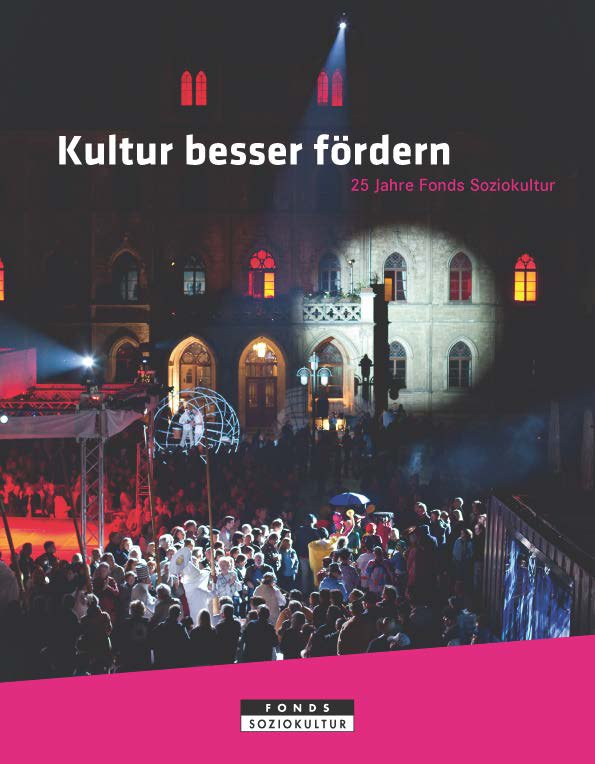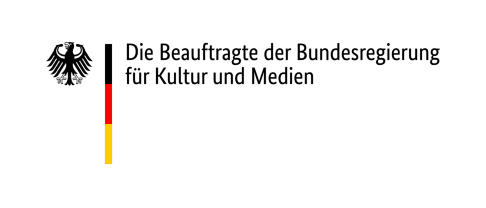Tips for applicants
Introductory remarks
These tips for applicants only apply to the regular programs of the Fonds Soziokultur. Special conditions apply to the Profil:Soziokultur call for proposals. Further information can be found here.
The members of the board of trustees (who are all unpaid volunteers) of the Fonds Soziokultur must gain an overview of the various grant applications within a relatively short space of time. It is thus very helpful if the project is described very precisely and in a well-structured way in the application. When writing your application you should try to word it in such a way that someone who is not familiar with your institution/initiative and your project can form a (good) impression quickly. In addition to this, you should submit your grant application to our administrative office as early as possible. This will give our staff the chance to assess it carefully and, if required, to contact you if any editing/additions are required.
The staff at the administrative office will be pleased to provide you with advice if required: Zum Kontakt (Go to contact - only available in German)
No mainstream (institutional) grants
The funding provided by the Fonds Soziokultur is intended solely for stand-alone projects, in other words, projects which have a clearly defined focus and time line; mainstream funding (such as meeting the costs of an institution’s ongoing programme of work; ongoing administrative office costs; series of events; ongoing programme of courses or similar) is not possible. Applications for grants to cover investment expenditure (equipment/construction investment) are also not eligible.
Basis for decisions
The Fonds Soziokultur e.V.’s board of trustees decides on the allocation of grants on the basis of the fund’s funding principles/grant regulations. Allocation decisions are based solely on application forms. The board of trustees does not assess additional documents such as project descriptions, concepts, videos or similar.
When completing the application form, it is very important that you describe the project for which you would like a grant precisely and in a well-structured way. Someone who is not familiar with your institution or your project should be able to understand what the grant will be used for.
Application
Applications for grants must be submitted via the Antragstellung online portal (only available in German) of the Fonds Soziokultur (Sociocultural Fund). Each funding programme has its own specific application form. An online version of the relevant form for each funding programme is provided in the online portal. You can use these online versions to work on your application form; save it; come back to it later and submit it to the Fonds Soziokultur when it has been completed. Applications can only be submitted digitally; the system will automatically send a copy of your application to the email address which you provided when setting up a user account. It is not necessary to submit further documents.
If you have a detailed costs and financial plan, then you should email it to antrag_at_fonds-soziokultur.de as a PDF after submitting your application. Please include your project number (stated in the copy of your application) in your email subject heading. This will allow us to collate your subsequent submission more quickly. Thank you!
Forms must be completed in full. This includes, in particular, the applicant’s details; a precise project description; information on the project timeline (incl. cost-relevant time required for preparatory and post-processing work); the compilation of a costs and financial plan and information regarding the amount of funding which is being applied for from the Fonds Soziokultur.
Early project begin
As a matter of principle, projects cannot begin before the board of trustees has held it meetings to allocate grants. The earliest dates on which projects can begin are published in the information about the corresponding funding programme provided on our websites and in the corresponding press announcements.
Conceptional preparatory work will not impact funding. Such work includes: Identification of funding options; identification of cooperation partners; discussions with possible participants; advance announcement on own websites; etc.
In exceptional cases project activities can be approved before the relevant published date. Such approval however relates solely to the following organisational issues: Signing of fee agreements with artists; renting of project premises; early travel bookings to qualify for discounts; signing of cooperation agreements or similar). In such cases the project coordinator must submit a request to the fund for approval of an early project begin, stating the date on which the project should begin; an explanation of the activities in question and why this early start is necessary.
Approval of an early begin will not be given if key elements of project activities (e.g. rehearsals, workshops, printing of posters, etc.) should take place prior to the board of trustees’ meetings.
Funding volumes/ rates
The Fonds Soziokultur (Sociocultural Fund) generally has annual budgetary resources in the range of up to EUR 2 million to cover its remit. Each funding programme has its own maximum funding limit. These funding limits are stated on the relevant funding programme website.
Costs and financial plan
Please make sure that your costs and financial plan states the overall costs for your project and not just costs up to the grant amount for which you are applying to the Fonds Soziokultur.
As a general rule, funding by the Fonds Soziokultur takes the form of a grant to cover some of the overall costs for a project.
The costs plan should only cover costs for which there will be a subsequent verifiable flow of money; in other words, no so-called contributions in kind (e.g. voluntary work, free provision of equipment or premises, loss of rental income; etc.).
The financing plan should also only cover costs which will subsequently be available as euro cash funds to pay invoices (i.e. no donations in kind, voluntary unpaid working hours, etc.).
Eligible costs (selected examples)
As a matter of principle, all cash costs incurred within the scope of the project in euros (excluding investments) is eligible for funding. Such costs could be:
Fee costs; lump sums for voluntary work (if they are actually paid out); proportional sum of personnel costs for permanent members of staff (the number of hours which staff will work on the project or it must be stated whether the scope of employment contracts will be increased for the duration of the project). In addition to this, the applicant must clarify whether he/she receives institutional funding to cover the relevant employees’ salaries. Where personnel costs are already financed via mainstream funding, such funding must be stated on the income list as third-party funding, including the comment “Mainstream funding”); KSK artists’ social insurance
Rent for premises; advertising; printing of posters/flyers; rental of technical equipment; travel costs; accommodation expenses; set building; Gema performers’ fees; other fees; purchase of small items (purchase price less than EUR 800 net per single purchase)
Non-eligible costs (selected examples)
Investment expenditure: The Fonds Soziokultur is not permitted to fund investment expenditure. This includes all purchases where the purchase price exceeds EUR 800 net per single purchase. Should, however, the costs plan only comprise purchases of small items (less than EUR 800) and other costs (e.g. fees), then the entire application must be classed as an investment application and is thus not eligible for funding.
Lump sum for administrative costs: Lump sums for office or administrative costs cannot be accepted. All costs must be subsequently documented via individual receipts (all postage, purchase of printer cartridges, telephone bill, etc.).
Lump sums for travel: Travel costs must be reimbursed as per the provisions of the German Federal Travel Costs Act (Bundesreisekostengesetz). Lump sum reimbursements are not eligible for funding.
Costs for which there will be no subsequent flow of money (voluntary work, fee waiver, free use of premises or technical equipment).
Fees for loss of rental income: Should the applicant have their own premises which will be used for the project, then they cannot assert any claim for possible loss of income which would have been earned by renting out these premises.
No link to the financial year
Grants allocated by the fund are not linked to the financial year (calendar year). Projects can thus continue into the following year if required.
Applications from public institutions
The Fonds Soziokultur primarily supports independent organisers of cultural work (clubs, initiatives).
No double funding
The Fonds Soziokultur is not permitted to support projects which receive grants from the German Federal Government Commissioner for Culture and Media (BKM); from an institution which receives long-term mainstream funding from an institution with a long-term grant from the BKM (e.g. the Hauptstadtkulturfonds, Stiftung Kunstfonds, Deutscher Literaturfonds, Fonds Darstellende Künste, Stiftung Preußischer Kulturbesitz) or from the Kulturstiftung des Bundes (German Federal Cultural Foundation).
“External applicants"
As a matter of principle it is possible for sociocultural initiatives/ institutions to apply for Fonds Soziokultur grants to fund projects which are planned to take place at a location other than one at which their headquarters are located. In such cases the corresponding project concepts should, however, be developed with a clear link to the relevant location and local cooperation partners should be included in the project development and implementation.
School projects
As a matter of principle it is possible for independent organisers of cultural work who wish to develop and implement a project in cooperation with one or more schools to apply for a Fonds Soziokultur grant to fund it. Such projects cannot, however, be a substitute for school lessons; they must take the form of an additional offering. In other words, both in-school and out-of-school project offerings should always be available. The board of trustees places great value on participation in such project being on a voluntary basis.
Anniversaries
The allocation of grants to projects which mark an anniversary (e.g. 20 years of the XY cultural centre) is only possible if the anniversary is not the project’s main focus. On the contrary, the anniversary should only be the starting point for reflecting on the relevant initiative’s/cultural institution’s prior work and assist in developing new fields of action and formats for cultural work for the project coordinator.
Cultural festivals
As a matter of principle, funding of a cultural festival is possible if the event in question is a new (independent) festival or – in the case of a series of festivals - is a festival with a clearly recognisable concept which sets it apart from its predecessors. Where a grant application relates to the framework programme of a festival, then funding can only be allocated if this programme is an integral part of the festival.
Art and cultural events
Purely artistic productions
The decision-making process places extremely great value on the active participation of laypeople. In line with this, in the case of purely professional productions or art projects the board of trustees frequently decides that the applications do not fall within the Fonds Soziokultur’s funding remit.
Our magazine Kulturszene (pdf download - only available in German) or the Projektbeispiele (Project examples – only available in German) section present numerous examples of projects which have been awarded grants. This provides a good impression of what type of project ideas are likely to be eligible for a Fonds Soziokultur (Sociocultural Fund) grant.
Scholarships
The Fonds Soziokultur does not award scholarships
„Einen verdammt guten Antrag schreiben" - Artikel aus der Publikation 25 Jahre Fonds Soziokultur
(“Writing a damn good application” - An article included in the publication “25 Jahre Fonds Soziokultur (“25 years of the Fonds Soziokultur”)
“Ein Beitrag zur Arbeitsweise und Entscheidungsfindung des Kuratoriums” (A contribution on the working practices and decision-making processes of the board of trustees)
by Jochen Molck and Kirsten Witt
(Please note: The publication and thus also the article date from 2016. At that time other percentage funding options were available)
Download article (only available in German) here




